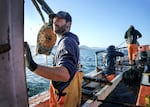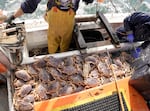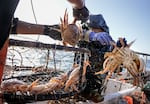Episode 1 of Season 2 of OPB’s video series “Superabundant” (above) follows Oregon’s Dungeness crab industry from the ocean bottom to restaurant tables, with a crab race for added kick. This article takes a deeper dive into one key aspect for fisherfolk: how one season can bring in big bucks, and the next, not so much.
On a calm morning last May, the three-person crew of the FV Misty dropped into the Pacific Ocean off of Port Orford, in Southern Oregon, to catch a small piece of a large fortune.
It’s not easy money though, by any stretch. A day of pulling in hundreds of crab pots is relentless and fast-paced work, requiring razor-sharp choreography from a seasoned crew.

Commercial fisherman and boat captain Aaron Ashdown, left, leads a crabbing trip aboard the FV Misty off of Port Orford, Ore., May 17, 2022.
Arya Surowidjojo / OPB
They have to grab a crab line from the water, feed it through a motorized pulley and reel the pot to the surface — all while maneuvering the moving boat. Each pot is then rapidly emptied and sorted, keeping only male crabs of legal size in line with the state’s fishery sustainability rules.
Then: repeat, again and again, traversing the coastline. It is exacting, hardcore and exhausting even to watch.
After a few runs, however, the deck floor of the Misty became a carpet of glistening, scuttling crabs, and the crew started to relax a little.

Dungeness crab waiting to be sorted on the deck of the FV Misty off of Port Orford, Ore., May 17, 2022.
Arya Surowidjojo / OPB
Boat captain Aaron Ashdown can remember joining the family business when Dungeness crab was worth $2.50 per pound in starting price. “My dad told me, because a crab is about maybe two pounds, ‘There’s just little $5 bills all over the bottom of the ocean and all we got to do is go out there and pick them up.’”
By the 2022 season, that value had risen to a record $5 starting price, unprecedented for Oregon.
“So you could almost double that analogy. Instead of $5 bills, now those things are $10 bills on the bottom of the ocean. Everyone was ecstatic,” Ashdown said.
It meant an exceptional crabbing year for commercial fishermen up and down the coast, driven by already high prices from the growth of Oregon’s live crab market (people, like most animals, love eating their crab fresh). But other forces also converged at the right time to drive up the starting price.
No negotiation necessary
Each Dungeness crab season would normally be preceded by state-supervised price negotiations between commercial fisherfolk and crab processors — buyers that would pick, package and freeze the caught crab as “processed” products. Sometimes these talks would break down and result in strikes. But those negotiations didn’t happen for the 2022 season, which was a unique situation.
“No one wanted to fight about price,” said Amanda Gladics, an Oregon Sea Grant associate professor of practice with Oregon State University’s Extension Service. “We had a lower volume year and there weren’t as many crabs in the freezer from the previous season that were still available to sell.”
Additionally, the coronavirus pandemic played a role by bottling up and then unleashing a year’s-plus worth of consumer demand for Dungeness crab.
[Listen to an Oregon fisheries expert’s interview with OPB “All Things Considered” host Crystal Ligori about the fluctuations of the crabbing seasons and what the future holds for crabbing on the West Coast.]
“We had all of the restaurants opening back up after lockdowns, and there’s a really pent-up demand for being able to have a fancy crab dinner out at a restaurant. So the price floated on the open market and they ended up with an opening price that was almost $5 a pound, which is just unheard of.”

The crew aboard the FV Misty pulls up a pot of Dungeness crab off of Port Orford, Ore., May 17, 2022. The 2021-2022 season saw record high prices and a punctual start to commercial crabbing right on Dec. 1, 2021.
Arya Surowidjojo / OPB
That record crabbing season also started right on schedule, on Dec. 1, 2021, providing an influx of cash to Oregon coastal communities just in time for the holiday season and beyond.
“It’s people being able to donate at the PTA fundraiser. And sponsoring the little league teams and things like that you don’t think of as connected to fishing. It really can make a difference in the whole community,” said Gladics.
The 2022 Dungeness crab season was the most lucrative ever in Oregon, one that would eventually gross over $90 million for the state’s commercial fisherfolk.
But they’re not all good seasons.
The 2023 Dungeness crab season in most of Oregon started on Jan.15, a month and half late. Blame low meat yields and rising levels of algae toxins, increasingly common in recent years.
Coastal cash ebbs and flows
The volatility of the Dungeness crab industry means those communities will continue to experience waxing and waning cash flow. For the fisherfolk who source the crab, however, it’s all part of working with the ocean — some have even accepted the seasonal variability as akin to a hunting and gathering life.
“When we do harvest it, you get that level of satisfaction because you’re going to get that to someone over in the Midwest or whatever,” said Ashdown.
“I feel really good about it. It’s the most satisfying job I’ve ever had in my life.”
Subscribe to the Superabundant newsletter to check out a tasty Singapore-style chili crab recipe from Portland’s Sibeiho.
Related: Watch more “Superabundant” here

